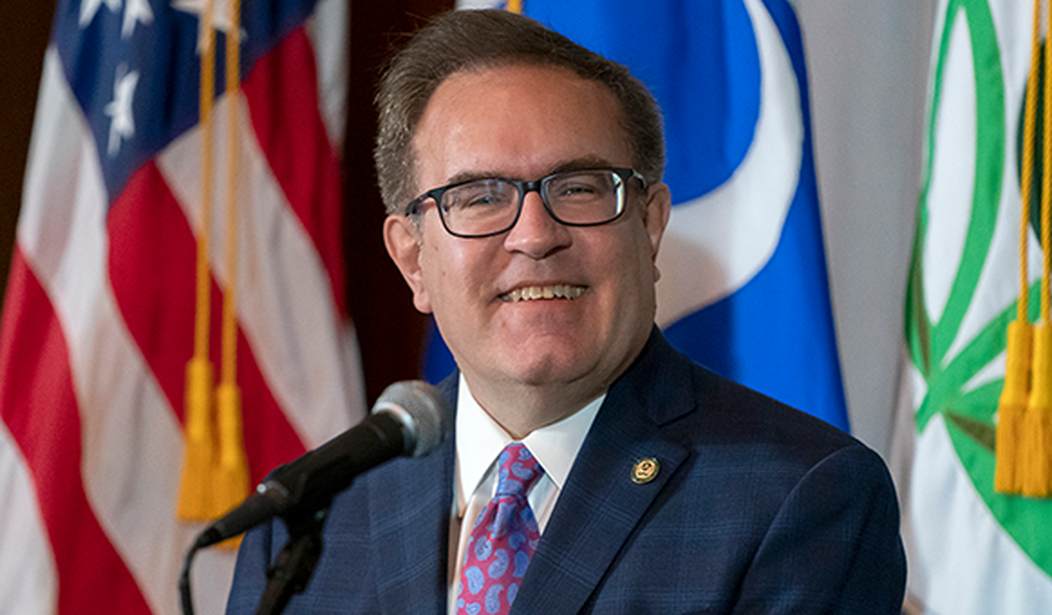How did our environment fare under the Trump administration these last four years?
Was the impact “disastrous” as critics prophesied? Did President Donald Trump’s policies accelerate global warming? Were his policies a “joke” or bad for the environment as the media and environmental groups claimed? Did Trump’s administration actively undermine our clean air and clear water standards?
According to Environmental Protection Agency (EPA) Administrator Andrew Wheeler, these characterizations are simply hot air.
Administrator Wheeler recently chatted with me about the agency’s accomplishments across its 50-year history, what the media got wrong about Trump’s environmental record, and more.
Legacy Media, Environmental Groups Distorted Trump Policies
The agency’s 15th administrator continued former EPA Administrator Scott Pruitt’s “Back-to-Basics” agenda—constantly drawing the ire of critics hellbent on discrediting their efforts.
Previously deputy EPA administrator, he was confirmed by the U.S. Senate in February 2019 to fill the role vacated by his boss Pruitt (who resigned in July 2018).
“So many environmental reporters, so-called environmental reporters, are actually activists. They’re not practicing journalistic standards,” Wheeler lamented. “They have a habit of only reporting bad news. They don’t want to report any good news.”
With respect to the deregulation doctrine ascribed to President Trump, Wheeler claimed legacy media distorted EPA’s alignment with Executive Order 13771 to reduce regulation and control regulatory costs.
“We have deregulated,” Wheeler admitted. “We saved [the] American taxpayer 100 billion dollars. But in many cases when we deregulate, we replace the regulations with a new regulation that updates the science— updates the standards.”
Recommended
He expressed his frustration with past agency heads who piled regulation on top of regulation or “guidance document on top of guidance document.”
“What we’re doing is doing away with two or three old regulations and replacing it with one. It’s sort of cleaning house,” he added.
Did his efforts to rein in the agency lead to rampant environmental destruction across the U.S.? The evidence clearly suggests otherwise.
The EPA recently published findings showing greenhouse gas (GHG) emissions are currently at historical lows, despite our exit from the unenforceable—and equally disastrous—Paris Climate Accords. Per a recent EPA report, emissions were down five percent between 2018-2019. This year alone, emissions are down an impressive nine percent compared to last year.
As for Superfund cleanups of toxic sites, Wheeler proudly touted his work on this front.
“We’ve cleaned up enormous numbers of [Superfund] sites across the country, and it’s really an achievement,” Wheeler said.
And one unlikely source, POLITICO, agreed with the sentiment and aptly concluded, “The EPA under Trump has showed what it can look like when an administration gets serious about cleaning up long-neglected sites... Some have seen their backyards and communities finally cleaned up because of the Trump administration’s EPA.”
The media, he added, also downplayed America’s foray into energy independence, ushered in pre-coronavirus by natural gas exploration and hydraulic fracking.
Wheeler explained, “We produce our natural gas here in the most environmentally-conscious manner of anywhere in the world. Our natural gas is producing the cleanest. I’m using the best regulations and the cleanest standards of anywhere.”
Detractors also didn’t foresee the Trump administration, particularly the Army Corp of Engineers, denying the proposed Pebble Mine permit in Alaska’s Bristol Bay— the last remaining pristine salmon fishery in the U.S. Why? They listened to public input and the concerns of Trump-aligned conservationists Donald Trump Jr. (President Trump’s son) and Nick Ayers (Vice President Mike Pence’s former chief-of-staff).
Wheeler confirmed this and noted, “He [President Trump] has stood up for the environment on the Bristol Bay in Alaska.”
All About Transparency
Past EPA policies, Administrator Wheeler argued, had “a perverse outcome in communities.”
As a result, the avid hiker said his goal was to prioritize transparency in the rulemaking process. Most recently, the EPA announced a new cost-benefit analysis report relating to the Clean Air Act—a template, he hopes, future agency heads will emulate in the years ahead.
“All our cost-benefit rule does is require the agency to put in the preamble of future rulemakings what are the costs and what are the benefits—to follow a standardized method of identifying these costs and these benefits,” he added.
Conclusion
Since EPA’s inception 50 years ago, our nation has emerged as a global environmental leader.
Has the agency always had our best interests in mind? Not always. (See the Obama administration’s EPA and revisit its innumerable scandals.) But under President Trump, it promoted the notion that a healthy environment can happily coexist with a healthy business climate.
Will history judge this EPA kinder than critics currently allow? It remains to be seen.
Townhall readers can learn about the EPA’s happenings online and connect with Administrator Wheeler on Twitter and Parler.























Join the conversation as a VIP Member